Last month, in Punta del Este in Uruguay, after a week of intense talks, negotiators from 100 countries brought to life the first international scientific panel to provide robust, independent information on chemicals, waste and pollution prevention to policymakers. The new panel, which is yet to be named, is seen as a historic step towards putting chemical waste and pollution on a par with climate change and biodiversity loss.

‘I think we were all relieved that something was agreed,’ says Gabriel Sigmund, a micropollutant researcher at Wageningen University and a board member of the International Panel on Chemical Pollution (IPCP), an independent academic group present at the meeting. ‘But it has, let’s say, a cautious aftertaste, because a lot of the text is still in brackets, which basically means [that] legally, there’s not much’.
Important details – such as conflicts of interest policies, financing, and even some aspects of the panel’s scope, objectives, and functions – remain unclear. Experts worry that the mechanisms for selecting the voices that will shape the research might leave important stakeholders out, and environmental groups fear that the lack of clarity will delay action on an urgent problem.
Nevertheless, independent observers of the meeting expressed a sense of relief after four years of tense negotiations.
‘If we had just made an agreement to, you know, meet and have coffee once every two years, that would be better than nothing, which is what we had,’ says Tom Welton, a chemist at Imperial College and the Royal Society of Chemistry’s ambassador for sustainable chemicals policy.
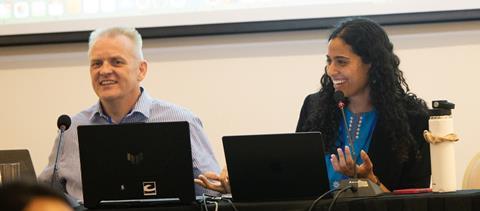
Unsteady start
In March 2022, the United Nations Environment Assembly decided to establish a science-policy panel on chemical pollution and waste management by 2024. As the 2024 deadline approached, negotiations became increasingly heated, says Miriam Diamond, an environmental scientist at the University of Toronto and member of the IPCP who attended all the meetings in Uruguay. By the end of the 2024 meeting, when countries failed to reach a consensus, everyone worried, she says. But it was in Punta del Este where hope reached an all-time low.
The Punta del Este meeting ‘was a rollercoaster of emotions’, according to Diamond. ‘There were countries that made it their business to rip and tear and shred multilateralism,’ she says. In her words, the meeting sometimes felt like a gathering with several capricious two-year-olds, where attending members wondered, ‘Is this party going to work, or is it going to explode because of the tantrums?’ And, she said, ‘tantrums were abundant’.
Several experts pointed out that a handful of countries with deep ties to the petrochemical industry, such as the US, Russia and some Middle Eastern countries, fiercely advocated for the panel’s work to focus on air pollution – avoiding discussion of ocean and soil contamination – and pushed to remove pollution prevention and the protection of human rights as goals. Other countries, like Argentina, also opposed any mention of the word ‘gender’ or acknowledgement of the gendered impacts of some forms of chemical pollution.
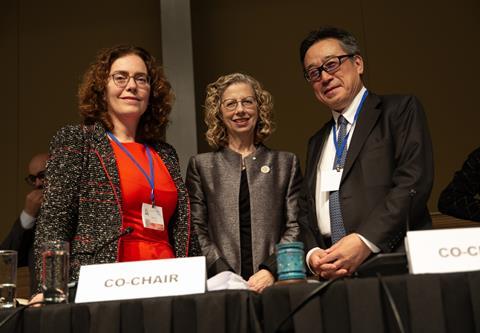
For David Azoulay, environmental health programme director at the Centre for International Environmental Law (CIEL), who attended the meetings, ‘multilateralism is being hijacked by those who want to make it as inefficient as possible’. By disputing language on nearly every point under consideration, these countries pushed – and succeeded – in instilling the idea of total consensus to move forward, which meant that countries aligned with the minimum ambition possible, Azolay says.
Environmental groups, such as CIEL and the International Pollutants Elimination Network, as well as independent observers, are concerned that similar strategies will be employed in August, when countries meet in Switzerland for what is supposed to be the final round of negotiations to establish a global plastic pollution treaty.
‘In the same way that the plastic treaty negotiations are being poisoned by countries with vested interests in maintaining oil production that turns into plastics, they’re saying, essentially, “we’re protecting our polluting industries”,’ Diamond says.
Structural problems
Another point of contention was the structure of the panel. Based on how the climate change and biodiversity panels work, the new panel’s decision-making body will have a representative from every member state. Countries will approve budgets, select the members of the bureau and secretariat, which will manage the scheduling and operations and, more importantly, nominate and select the scientists for the panel.
This committee will be the ‘scientific heart’ of the panel, explained Moritz Petersmann at the University of Eastern Finland, who is studying the role of science policy institutions in global environmental governance. The committee will vet research proposals for the panel, prioritise assessment topics and shape the scope and questions addressed in the panel’s reports. In essence, it will set the panel’s agenda.
For that reason, who gets to participate was highly controversial, Diamond says. Initially, some observers suggested including non-governmental stakeholders as committee members, a proposal that was quickly watered down to include them just as observers and ultimately exclude them entirely.
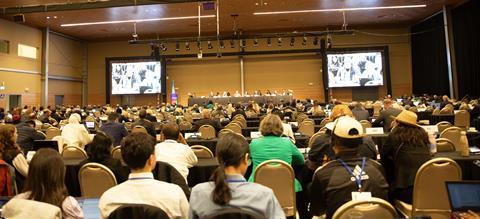
‘Observers should have been included,’ Diamond says. ’Their participation, supported by a very strong conflict of interest policy, would give true meaning to the interdisciplinary [aspect].’
Excluding Indigenous peoples, labour groups, industry and environmental health advocates from the ‘scientific engine room’ might risk the effectiveness of the new panel, says Tim Forsyth at the London School of Economics, who studies international and local environmental governance. Forsyth, who co-authored a paper challenging the proposed structure, worries that countries will select experts who mostly come from labs, which might result in an extremely narrow understanding of the problem.
Integrating experts who can draw a line from a substance’s biological and chemical hazards and economic incentives, policy and regulations to determine which populations are most at risk can increase the panel’s impact and effectiveness, Forsyth says.
Taking into account the fragmented landscape of chemicals and waste policy is key for this panel, Petersmann adds. ‘There’s [a] risk that the knowledge [generated by the panel] is not taken up by any organisation.’
But there’s even more immediate trouble ahead – funding. The Global Environment Facility, which manages funds to implement multilateral environmental agreements, is scheduled to be replenished next year. With key players, like the US and Europe, shifting priorities away from international collaboration and science, ‘money is going to be extremely tight’, Diamond warns.
Diamond is still hopeful, however. For her, one of the most emotional moments of the Punta del Este meeting was when the US representative, Elizabeth Nichols, took the floor and expressed her unwavering commitment to international cooperation. ‘It was so emotional because no one else said it with such clarity,’ Diamond explains. ‘Multilateralism is flawed, but it’s a whole lot better than not having multilateralism.’



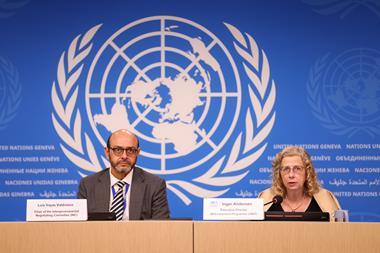
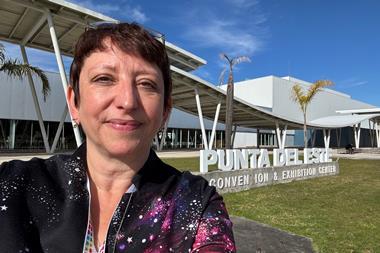










No comments yet